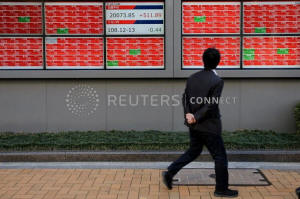|
Stocks erase week's gains after weak
manufacturing surveys
 Send a link to a friend
Send a link to a friend
 [April 18, 2019]
By Ritvik Carvalho [April 18, 2019]
By Ritvik Carvalho
LONDON (Reuters) - Global shares erased
this week's gains on Thursday after weak manufacturing surveys from Asia
and Europe stoked fears of a slowdown in global growth, adding to profit
taking ahead of the long Easter weekend.
After a subdued open, European markets fell further after French and
German surveys of purchasing managers in the manufacturing sector for
April showed activity continuing to contract.
Germany's DAX more than doubled losses on the day to trade 0.3 percent
lower after the release of the German survey, while the pan-European
STOXX 600 index was down 0.2 percent. [.EU]
The euro fell to its lowest in over a week after the data, down 0.4
percent on the day to $1.1247. [FRX/]
German 10-year bond yields were lower three basis points at minus 0.5
percent, dropping further off Wednesday's high of 0.10 percent. [GVD/EUR]

Activity in Germany's services sector rose to a seven-month high in
April, but investors focused on the 44.5 reading for the manufacturing
sector, well below the 50.0 mark separating growth from contraction even
if it was above the 44.1 reading last month.
"The reading was better than last month, but below expectations and we
could see from the market report that once again it's the core industry
for Germany that's the worry - the carmakers are struggling," said DZ
Bank analyst Sebastian Fellechner.
He said the performance of the German manufacturing sector, often
referred to as the engine room of Europe, has ramifications for the bloc
as a whole.
The weak surveys out of Europe added to a weak Japanese reading on
manufacturing activity, which also showed new export orders fell at the
fastest pace in almost three years.
MSCI's All Country World Index, which tracks stocks in 47 countries, was
down 0.3 percent on the day. It erased all gains for the week after the
German data.
The VIX volatility index, also known as Wall Street's "fear gauge",
inched up to 13.12, back to where it was at the start of the week. On
Wednesday, the index had fallen to its lowest since August 2018.
E-mini futures for the S&P 500 were down almost 0.3 percent.
Market participants are also eyeing signs of progress in U.S.-China
trade negotiations.

[to top of second column]
|

A man looks at an electronic board showing the Nikkei stock index
outside a brokerage in Tokyo, Japan, January 7, 2019. REUTERS/Kim
Kyung-Hoon/File Photo

Washington and Beijing set a tentative timeline for a fresh round of
face-to-face meetings ahead of a possible signing ceremony in late
May or early June, according to a Wall Street Journal report.
The U.S. trade deficit fell to an eight-month low in February as
imports from China plunged, data on Wednesday showed.
Separate figures from China earlier on Wednesday showed the world's
second-largest economy grew at a steady 6.4 percent pace in the
first quarter, defying forecasts for a slowdown.
Attention is now turning to how much more stimulus Beijing will
apply without triggering more financial risks.
Elsewhere in currencies, the dollar was 0.3 percent higher against a
basket of peers at 97.261.
The Australian dollar was 0.2 percent lower at $0.7163. It had
earlier jumped to $0.7200 as traders wagered the Reserve Bank of
Australia will not rush to ease rates even though the broader
economy has seemingly lost momentum.
Oil markets fell despite a surprise decline in U.S. inventories, but
the price drops were tempered by a smaller-than-expected reduction
in gasoline stocks and ongoing OPEC-led supply cuts. [O/R]

Brent crude futures were 0.5 percent lower at $71.24 per barrel,
while U.S. crude futures were 0.44 percent lower at $63.48.
(Reporting by Ritvik Carvalho; additional reporting by Abhinav
Ramnarayan in London and Shinichi Saoshiro in Tokyo; Editing by
Janet Lawrence)
[© 2019 Thomson Reuters. All rights
reserved.]
Copyright 2019 Reuters. All rights reserved. This material may not be published,
broadcast, rewritten or redistributed.
Thompson Reuters is solely responsible for this content. |